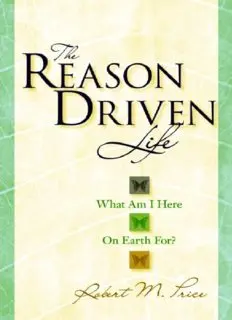
The Reason Driven Life: What Am I Here on Earth For? PDF
Preview The Reason Driven Life: What Am I Here on Earth For?
What Am I Here on Earth For? &Y/~ti"' Prc& Contents Foreword Introduction One It Is about You Two You Are a Work of Art Three OneTrack Mind? Four Sons of Dust Five My View Is God's View Six No Changes Are Permanent, but Change Is Seven The Mystery of Everything Eight God: Planned for Our Pleasure Nine What Makes Me Sick Ten The Achilles' Heel of Worship Eleven Becoming Imaginary Friends with God Twelve Providence and Superstition Thirteen Worship That Creates God Fourteen I Can't Get No Sanctification Fifteen Joining the Sect Sixteen The Greatest of These Seventeen A Place to Conform Eighteen Heretics Anonymous Nineteen Price's Ten Commandments Twenty Healing Religious Divisions Twenty-one Damage Control Twenty-two The Character of Christ Twenty-three When Is a Religion Not a Religion? Twenty-four This Paper Idol Twenty-five Jesus with a jackhammer Twenty-six Satan's Sunday School Twenty-seven Temp Job Twenty-eight Jerusalem Wasn't Built in a Day Twenty-nine Service Industry Thirty Cut Out the Holy Ghost Noise! Thirty-one Cogs for Christ Thirty-two Being Who You Are Thirty-three How Twisted Texts Scream Thirty-four Meetings with Unremarkable Men Thirty-five War Is Peace/Freedom Is Slavery/ Weakness Is Strength Thirty-six Made into Missionaries Thirty-seven Fabricating Your Life Message Thirty-eight The Hidden Agenda of Witnessing Thirty-nine Juggling Your Life Forty Not without Reason Bibliography Foreword Whenever I'm around Bob Price, I think "Thank God for him." And then I remember that I really mean, "Thankfully, we have a Bob Price" and God probably had nothing to do with it. Bob Price is such a rare individual. He really gets it: the value of religious stories, the value of the community, camaraderie, and sense of communal spirit that religious organizations provide. He has great respect for the Bible as a repository of ancient wisdom and a source of the narratives we tell ourselves about how we came to be and how we see our struggles with nature and with each other. Bob Price isn't just a scholar of Christianity; he often references Buddhist parables, too. He can bring up just the right story to provide a counterpoint or add emphasis to an idea. And not just Buddhism, psychology, too: he can call on Jungian theory when it's meaningful and appropriate. Most important, he knows bull when he hears it. This book is not just a polemic against Rick Warren's The PurposeDriven Life. It's a beautiful, inspired, insightful work in its own right. I walked around for days after reading it filled with new ideas and a better way to look at my own life's predicaments. Then I read it again, and I got even more out of it. For almost my entire life, I was much like some of the people Price describes in this book. I was a Christian by default, and I didn't take it seriously enough for it to cause me any real trouble. Bob says that the most well-adjusted Christians he knows are those who don't take it seriously. (Whether they are exactly conscious of this or not!) I think that was me. I think I was well adjusted. But that doesn't mean that I wasn't also stunted in my maturity by the side effects of benignly believing in the Christian stories and the childlike idea of a loving God who was pulling all the strings. Then, there came a time when I was in crisis and I looked to my Christian faith to guide me. And it worked . . . at first. But then I looked closer and closer at what I professed to "believe" in and real ized that if you followed the Bible's own logic and reasoning, if you expected it to stand up to even a modicum of scrutiny, you were going to be bitterly disappointed. I began to think that even
